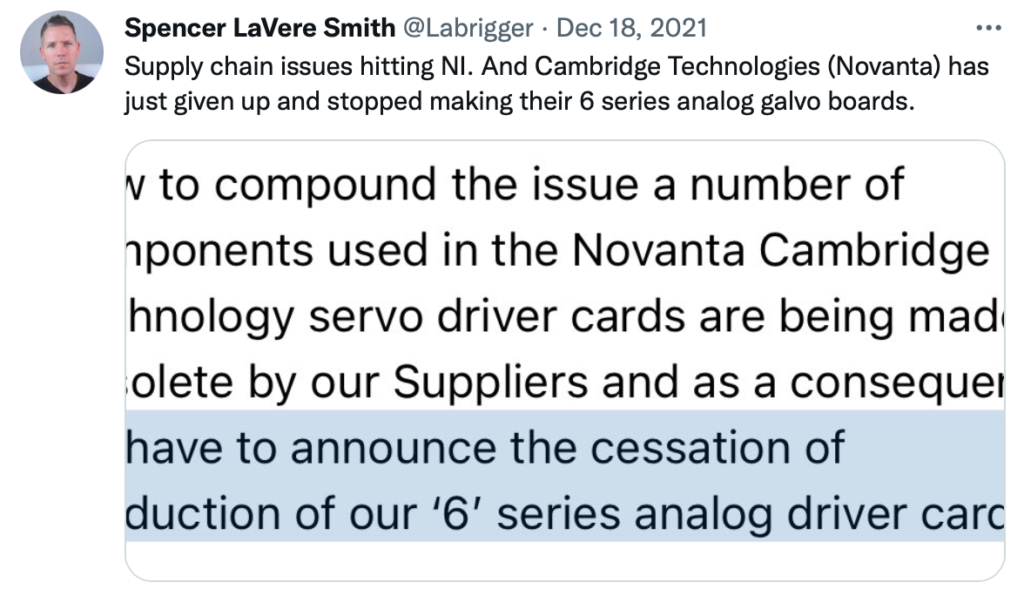Sourcing scan mirrors in early 2022
There are some companies that have no real competition. Maybe a product here-and-there in their catalog is subject to market forces, but most of their items have no competing options from other companies. Hamamatsu Photonics is a great example. There is competition in the sCMOS space (vs. their Orca series), but their PMT offerings have no parallel at any other company. If Hamamatsu closed their doors, I don’t know what we would do. Cambridge Technology was another one– they make galvo mirrors and resonant scanners used in laser-scanning microscopes. Both of these companies can have massive lead times (measured in months). Why carry stock that may (or might not) sell just to reduce lead times? We scientific customers adapt to it and carry on. Well, sometimes that situation can degrade. And that has happened at Cambridge Technology.
The ownership of Cambridge Technology has changed. They are now owned by Novanta. They stopped selling their 6-series galvos.

They have other galvos that can be used in laser scanning microscopes, but the lead times are still long. There are alternatives, including ScannerMax, which can work with Vidrio/MBF ScanImage. Thorlabs and Edmund Optics also have options. But they’re often repackaged products (still nice, because they carry stock and can ship right away) and/or lower performance products.
Resonant scanners are critical for high speed scanning. No other technology combines flexible scan amplitude, large (>5 degree) scan angles, and large (>5 mm) beam apertures. These products have even less competition than galvos. A friend of mine just reported that the Cambridge/Novanta resonant scanners they ordered in late 2021 won’t be delivered until 2023. Some competition in the resonant scanner market would be welcome. EOPC is another company to consider if you’re shopping around (and if you love 1990s era web page design).
MEMS mirrors are cool, but are typically small aperture and/or small scan angles (PDF link), so they’re not drop-in replacements for conventional laser scanning systems, which often require > 10 degree scanning and >5 mm apertures.

Hi –
I’m Ryan , Mechanical Engineer at ScannerMAX!
We love hearing from our customers, their challenges, and how we can
help make solutions for them!
We are very aware of what is going on in the market and the frustrations
shared by many. Please reach out to me on any of the contact pages on
our ScannerMAX site or through the email CONTACT at SCANNERMAX dot COM
and we would love to hear about your challenges, and how we can provide
solutions. Out lead times are measured in weeks for custom systems (not
months), and standard systems are available more quickly directly from
us or our distributor Edmund Optics
Another thing we are considering doing in the foreseeable future is
entering the resonant scanner market, and we would love to receive
feedback from our customers/potential customers on what is important to
them in a resonant system, so we can incorporate as much as possible
into our designs. We would love to hear from those in industry already
using the products!
Thanks,
Ryan
Mechanical Engineer
[comment posted here– sent to me via email because the comment system wasn’t working at the time]
eopc.com finally got around to updating our website! Kinda miss the old one.